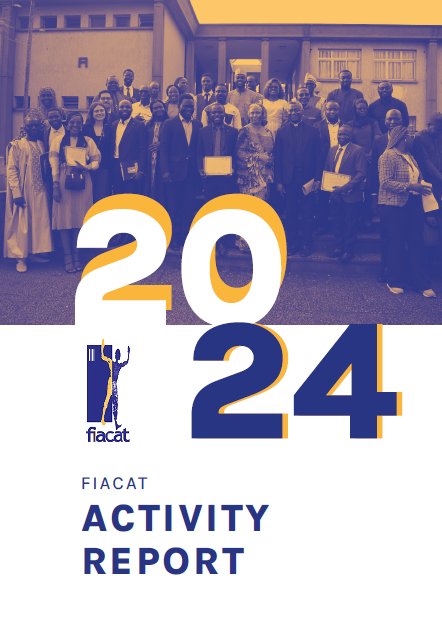63rd Ordinary Session of the African Commission on Human and Peoples' Rights
Item 3: Human rights situation in Africa
Madam Chair,
Dear Commissioners,
The resurgence of human rights violations in the Central African Republic, particularly by armed rebel groups, is of particular concern and reflects the need to continue efforts to combat impunity and transitional justice.
FIACAT and ACAT RCA congratulate the Central African Government for the establishment of the National Commission on Human Rights and Fundamental Freedoms and for the operationalisation of the Special Criminal Court. It is now crucial that these bodies be provided with the necessary resources to ensure their proper functioning and independence.
On the other hand, the Truth, Justice, Reparation and Reconciliation Commission is still struggling to be set up despite the creation, in September 2017, of a steering committee whose members were appointed on 8 March 2018.
FIACAT also welcomes the African Initiative for Peace and Reconciliation in CAR and the visit of the President of the African Union Commission on 18 September 2018 to Bangui. However, we would like to reiterate the need to exclude amnesty for perpetrators of war crimes and crimes against humanity and to ensure that victims of human rights violations and abuses are provided with adequate reparation measures.
FIACAT therefore encourages the Central African Government to continue and intensify its efforts to combat impunity and set up transitional justice mechanisms. It also calls on the African Commission on Human and Peoples' Rights to support these processes.
Madam Chair,
FIACAT and ACAT DRC are particularly concerned about the frequent human rights violations that continue to be perpetrated throughout the territory of the Democratic Republic of Congo by members of the FARDC, the Congolese police, armed groups or militias in total impunity. Despite government efforts such as the establishment of joint commissions of inquiry on the events of 31 December 2017 and 21 January 2018 and 19 September and 19 December 2016, political opponents, journalists and human rights defenders continue to be persecuted.
The elections, scheduled for 23 December 2018, are likely to exacerbate these human rights violations and FIACAT therefore calls on the Congolese government to continue and intensify its efforts to combat impunity and guarantee a safe environment for human rights defenders, in particular by revising the law on the protection of human rights defenders in accordance with the recommendations of the CNDH.
Madam Chair,
In Chad, the new Criminal Code, which was promulgated on 8 May 2017, no longer provides the death penalty for ordinary crimes, but maintains Special Act 034 on terrorism, which provides the death penalty for certain terrorism-related offences. While there were no convictions in 2016 and 2017, 4 people were sentenced to death on 26 September 2018 on the basis of the 2015 Act for an offense that does not constitute an act of terrorism.
However, the Chadian government, through its Minister of Justice, made commitments during the opening session of the Regional Congress on the Death Penalty in Africa, which was held in Abidjan in April 2018, to move towards a total abolition of the death penalty.
FIACAT and ACAT Chad therefore call on the Chadian government to commute death sentences to another sentence, to abolish the death penalty for all crimes, including acts of terrorism, and to vote in favour of the Resolution calling for a universal moratorium on the death penalty to be adopted by the United Nations General Assembly next December.
Madam Chair,
FIACAT would like to point out that Germain Rukuki, the former accountant of ACAT Burundi, was sentenced in April 2018 to 32 years' imprisonment for his activities as a human rights defender and has been in detention for more than one year now; this is the highest sentence handed down in this country against a human rights defender.
Finally, Madam Chair, FIACAT wishes to reiterate its commitment to a strong and independent African Commission on Human and Peoples' Rights.
Thank you, Madam President.



